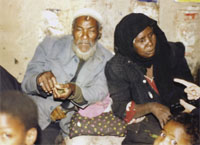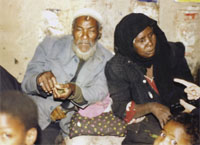
Yemen’s elderly receive little attention [Archives:2008/1120/Reportage]
January 14 2008
 |
For Yemen Times
Ali Al-Ansi, who is in his sixties, is a guard at a government utility. Easygoing, funny and welcoming with his companions, he's always smiling at his friends.
However, behind that smile, Al-Ansi hides much sadness and sorrow. Asked about his situation, he begins to cry, complaining about his old age and his bad health, which prevents him from attending work, especially in the winter.
“I suffer a lot of pain in my chest and other parts of my body. The physician didn't determine the cause of such pains; instead, he gave me painkillers,” Al-Ansi describes.
Living alone in the capital secretariat of Sana'a, his family members remain in their village. “I've been here for about 15 years now. I left my family in order to provide them with a pension when I die.”
Al-Ansi's circumstances are difficult, as he's unable to send his family even a small amount of money, nor can they send him any either. His salary isn't even enough to cover food, drink and clothing for himself.
“I don't spend much money each day. My breakfast is limited to just bread and tea because I can't eat anything else,” he adds.
He'll continue living this way for the next five years until his civil service ends and he and his family can reunite, unless something happens to him.
Al-Ansi isn't any better off than other elderly people in Yemen, many of whose families or relatives deny or discard them, thereby forcing them to live in cheap hotels, where they spend most of their time, on sidewalks or beside charitable societies.
For instance, “We discovered an 80-year-old man whose relatives had left him at our entrance. We had no alternative but to take him into our society, which is mainly for the disabled,” recounts a woman in charge at Al-Ihsan Charitable Society.
The needs of the elderly are one challenge facing Yemen today as it experiences rapid population growth. Poverty and the high cost of living have increased to the extent that the elderly are neglected.
“The Yemeni community's previous circumstances were much better than now and it was able to care for its elderly members. Even those without any relatives could find households to look after them,” observes Noor Ba'abad, deputy undersecretary for social care at the Social Affairs and Labor Ministry.
She continues, “However, today, social integrity and solidarity are practically absent, as population and economic changes have led to negligence of the elderly at the individual household, community and government levels, as well as within its development plans.”
Yemeni society is a youthful one, which justifies that the elderly aren't included or targeted in programs launched under governmental development plans.
Ba'abad further states, “The responsibility isn't only the government's, but also society's. It's wrong to hold the government accountable for everything because the community is responsible as well. Yemen's progressively increasing population additionally burdens its government to provide its youngest members their needs and requirements, including education and health, among others.”
This past November, Yemen's Social Affairs and Labor Ministry issued the first report of its kind on the conditions of the elderly in Yemen.
Requested by the United Nations Economic Commission for Western Asia, the report addressed the economic, social and legislative conditions of Yemeni elderly, showing that the state offers them care within its plans and strategies, such as the Poverty Reduction Strategy, because poverty was at 35.5 percent up until 2005.
The government's Social Care Fund offers monetary aid in several categories, and only 18 percent of the fund's aid is provided to the elderly.
The report also called on all state bodies including civil society organizations operating in humanitarian fields, to unite their efforts, maintain solidarity and determine appropriate solutions for this remarkably increasing group and its needs by delivering services, making laws and guaranteeing their rights.
While some 3,569 charities and unions were operating just in the field of social care in 2005, such associations don't target the elderly with their own special or direct programs; rather, they are included in those for the poor and the disabled.
“While we don't have any elderly programs, they are given priority when discovered within poor families and other targeted cases,” notes Sa'd Al-Aqra', director of Islah Charitable Society's social care and education department.
Elderly care ranges from providing food and shelter for those without relatives or those in strained circumstances to finding and/or preparing entertainment programs for those who are better off and residing with their families to spend their leisure.
The strained circumstances of Yemen's elderly are exacerbated in rural areas, where large numbers reside. Approximately 74 percent of Yemen's population lives in rural areas, where the maximum poverty level is 45 percent, as opposed to 30 percent for urban areas.
“Because the majority of elderly don't work for the government, they don't have a pension; thus, if their income decreases, they become poor and their situation worsens until they are forced to beg,” Ba'abad explains.
In discussing adopting the issues and concerns of the elderly, perhaps the problem isn't financial. For instance, the Yemeni state spends much to construct utilities with high standards and specifications in both the capital secretariat, as well as its other governorates. Further, charitable societies and individual philanthropists often build more than one mosque within a single zone rather than creating housing for the elderly or those in other needy groups.
As Ba'abad notes, “We don't lack funds or experience in caring for groups such as the elderly; rather, we seriously need the administration to be concerned about these issues and the expenditures at the government and charity levels.”
Many elderly are pleased when they find those willing to listen to their concerns. Al-Ansi was unable to hide his happiness at someone discussing his situation, for which he adamantly maintains that he's entitled to his rights and that the concerned parties should provide for the needs and adopt the issues of elderly citizens like him.
——
[archive-e:1120-v:15-y:2008-d:2008-01-14-p:report]


